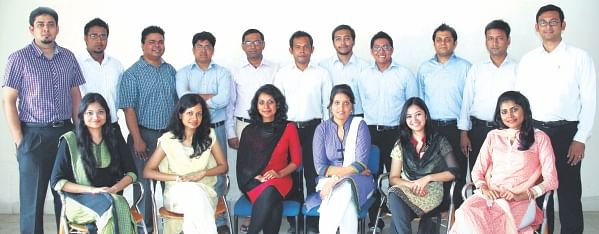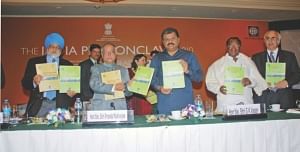| Home - Back Issues - The Team - Contact Us |
 |
| Volume 11 |Issue 24| June 15, 2012 | |
|
|
Venture e-Gen Consultants Naimul Karim
The consultancy profession in Bangladesh, as compared to some of the other countries in South Asia, remains a highly unexplored field. Seldom does one find a local firm that thrives on providing 'specialised advice' to businesses or individuals. As a result, a large number of projects related to development consulting, according to the World Bank, are currently in the hands of foreign firms. With a huge amount of revenue involved in this sector and a high demand in the international market for such services, Bangladeshi consultants feel that the country has failed to develop sufficient home-grown experts to utilise the opportunities available in this field. Amidst a highly foreign-dominated sector, however, one home-grown company has proved to be different. Having been awarded consulting projects by the likes of the World Bank and the Asian Development Bank (ADB) in twelve countries, e-Gen Consultants Ltd. is a rare example of a Bangladeshi consultancy firm competing in the international arena. “There's a lot of scope in this field. Consultancy companies are booming in other south Asian countries such as India and Sri Lanka. If they can do it, why can't we?” says Syed Munir Khasru, who founded the company in 1999. By working in projects dealing with the power, energy and finance sectors of countries like India, Iraq and Sri Lanka, e-Gen has proved that, given an opportunity, local consulting firms can successfully compete against international experts. Reports from the ADB state that of the $8.61 million dollars worth contracts provided to local consultants, e-Gen was awarded a total of $4.68 million this year. The highest ranked Bangladeshi owned consulting firm on the ADB's list, e-Gen is worth four times the total contract value of its nearest local competitor.
Some of the highlights of e-Gen's services include the development of the power and energy sector of Mongolia, developing the micro-finance system in Indonesia and creating a public private partnership (PPP) curriculum for India's national capacity building programme. The project in India, which, was launched in 2010 was designed to help the country achieve its target of $1 trillion in PPP investments in the 12th five year plan. Perhaps the most unique aspect of the company is that it's mainly run by a group of 20-year-olds. Mohammad Arbaaz Nayeem, Chief Executive Officer, for instance, is only 27 and is the oldest member of the management team. Working with a young team, however, doesn't necessarily mean that the company lacks in experience. As Nayeem puts it, “I think that experience is not a result of your age, but of what you have managed to achieve within a particular timeframe. Dealing in foreign projects, already puts me in a faster learning curve than many other people who are leading consulting firms. It's based on what you do, rather than how old you are.” However, the fact remains that the consulting sector in Bangladesh is still relatively new; as a result, not many believe in building a career out of consultancy. “People actually don't realise how hard it is to win contracts from donors. There are sleepless nights, foodless afternoons; we had to work on several proposals, cramped against deadlines. It has a lot more value addition than working for a corporate company,” explains Md. Rafiul Alam, 27-year-old Chief Operating Officer of the company. Echoing Alam's views, Nayeem says, “My friends sometimes tell me that I am wasting my potential here, but to me, I see the people who I have been able to impact; it's far better than working for a multinational company.” Stating an example of one of the projects he worked in, he says, “When I was a manager, I was running a project in India. A graduate from a business school of Bangladesh, advising the ministry of finance on how to handle their project is an achievement in itself.” Like Nayeem and Alam, a majority of the other members of the company are graduates from the different business schools of the country. “I always believed that our boys and girls could do a lot better than selling sim-cards, cigarettes or soaps for multi-national companies. We have a great pool of students that come out every year from different business schools, unfortunately very few manage to contribute to our economy,” says Munir Khasru, adding that he always wanted to build a young team. Munir Khasru states that the family structure, in privately-owned companies, discourages fresh graduates from joining local organisations. “Employees, if given the opportunity to move ahead in a company, won't stop. However, because of the family-run businesses in our society, many are discouraged. A company needs to provide scope for a person to grow,” he says. Despite working on a number of projects outside the country, e-Gen's participation inside Bangladesh remains limited. Majority of their in-bound projects have come through WB, ADB and other international agencies. “We think twice before sending in proposals for local projects since most of them are not fairly judged. For instance, take the Padma bridge scenario, it's clear that there's a lot of corruption involved and I don't want to win contracts by taking favours from influential people,” exclaims Khasru. Explaining the reason behind the lack of participation in projects inside the country, Nayeem says, “There's corruption in every part of the world. The difference is that in other countries, there is corruption and development. Here, there's corruption and very little development. If I can work with power and public finance in India, Indonesia or even Mongolia, I can definitely do the same job here. But over here, it's difficult to push for projects due to various hierarchal problems.” Considering the fact that Bangladesh is currently going through an acute energy crisis, one can't help but wonder as to how long companies like e-Gen will be compelled not to participate in the local biddings because of the absence of a level playing field within the country. With a young brigade ruling the company, e-Gen seems to be travelling on the right path. Although their aim, to be the most sought-after consultancy firm in South Asia is still many miles away, their recent performances indicate positive signs. By successfully competing in the international market, they have proved that the consultancy sector is a field with a lot of potential and can be a possible career-choice for many fresh graduates.
Copyright
(R) thedailystar.net 2012 |

